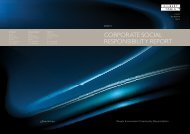Gilbert + tobin - Gilbert and Tobin
Gilbert + tobin - Gilbert and Tobin
Gilbert + tobin - Gilbert and Tobin
You also want an ePaper? Increase the reach of your titles
YUMPU automatically turns print PDFs into web optimized ePapers that Google loves.
The legal profession in Australia is essentially a split profession.<br />
Lawyers will generally practise as either a barrister or a solicitor.<br />
Solicitors provide legal advice <strong>and</strong> are involved in case preparation.<br />
Solicitors, upon commencement of court proceedings, will brief a<br />
barrister to appear in court <strong>and</strong> advocate for the client during the<br />
proceeding.<br />
19.4 Commencement of proceedings<br />
Selecting the correct court in which to commence proceedings is<br />
important, as the court must have the requisite jurisdiction for the<br />
matter to be heard.<br />
Limitation periods for commencing proceedings differ according<br />
to the type of action <strong>and</strong> the court in which the action is to be<br />
commenced. For example, actions founded in contract <strong>and</strong> tort<br />
must be commenced within six years running from the date the<br />
cause of action first accrues.<br />
19.5 Court procedure<br />
Each court system <strong>and</strong> tribunal has its own procedural rules.<br />
The superior courts in all jurisdictions have the power to make<br />
interim orders on an urgent <strong>and</strong> ex parte basis. This includes<br />
interlocutory injunctions to operate pending a final hearing <strong>and</strong><br />
determination of a proceeding, asset preservation orders <strong>and</strong><br />
search orders. Each court has a duty judge who is available on<br />
short notice (outside business hours) to hear urgent applications<br />
which cannot be satisfactorily accommodated within the ordinary<br />
system. In particularly urgent cases, applications can be heard <strong>and</strong><br />
orders made by telephone.<br />
In the Supreme <strong>and</strong> District Courts criminal trials for indictable<br />
offences are normally by jury. The accused may elect to be tried by<br />
judge alone for a state offence, but not a Commonwealth offence<br />
due to constitutional requirements. Only Queensl<strong>and</strong> <strong>and</strong> the<br />
Australian Capital Territory require unanimous verdicts. A<br />
majority verdict is generally accepted in all other states <strong>and</strong> the<br />
Commonwealth. The presumption in civil proceedings is that they<br />
will be tried without a jury, unless the interests of justice otherwise<br />
require. Civil proceedings are usually determined by a judge, or<br />
magistrate, without a jury. Exceptions include defamation <strong>and</strong><br />
personal injury proceedings.<br />
19.6 Costs<br />
In all Australian jurisdictions, the courts have a discretion to award<br />
costs as they see fit. In most cases, an unsuccessful party will be<br />
required to pay the successful party’s costs. There are generally<br />
two types of costs in Australia:<br />
+ + solicitor/client costs are the costs incurred by the client for the<br />
work performed, pursuant to the retainer between the<br />
solicitor <strong>and</strong> the client; <strong>and</strong><br />
+ + party/party costs are costs recoverable by the client from the<br />
other party, if a cost order is made in their favour. Party/party<br />
costs are determined under a court scale with fairly rigid<br />
principles (which in practice means the successful party will<br />
only recover around 50%–70% of the total solicitor/client costs<br />
that they have incurred).<br />
In some cases, costs will be awarded on a solicitor/client, or<br />
“indemnity” basis, where all but unreasonably incurred costs may<br />
be recovered. Indemnity costs are discretionary <strong>and</strong> awarded<br />
upon application, where there are good reasons for doing so – for<br />
example, where the party paying the costs unreasonably refused a<br />
settlement offer that was better than the judgment ultimately<br />
awarded or where there has been inappropriate conduct during<br />
the trial resulting in delays or additional costs.<br />
19.7 Production of documents<br />
“Discovery” is a process often ordered by a court, whereby a<br />
party is required to produce to the other party all documents<br />
within a party’s possession, custody or power that may shed light<br />
on any of the issues in the proceedings. In some situations, a party<br />
may also be required to discover documents in the possession,<br />
custody or power of an agent or employee, documents which a<br />
party has a right to obtain from another person <strong>and</strong> documents<br />
which a party would be likely to obtain, if it made a request to the<br />
owner of the document.<br />
The term “document” extends to any document, from letters <strong>and</strong><br />
accounts, to scrap pieces of paper recording information relevant<br />
to the matters in issue. The definition extends to electronic<br />
documents, email, tape recordings, microfilm, maps, plans,<br />
photographs, etc. Confidential non-privileged documents are not<br />
exempt from production (but may be the subject of confidentiality<br />
undertakings given by the other party).<br />
There are substantial differences to rules relating to discovery,<br />
depending on the rules for each court.<br />
PAGE 43







